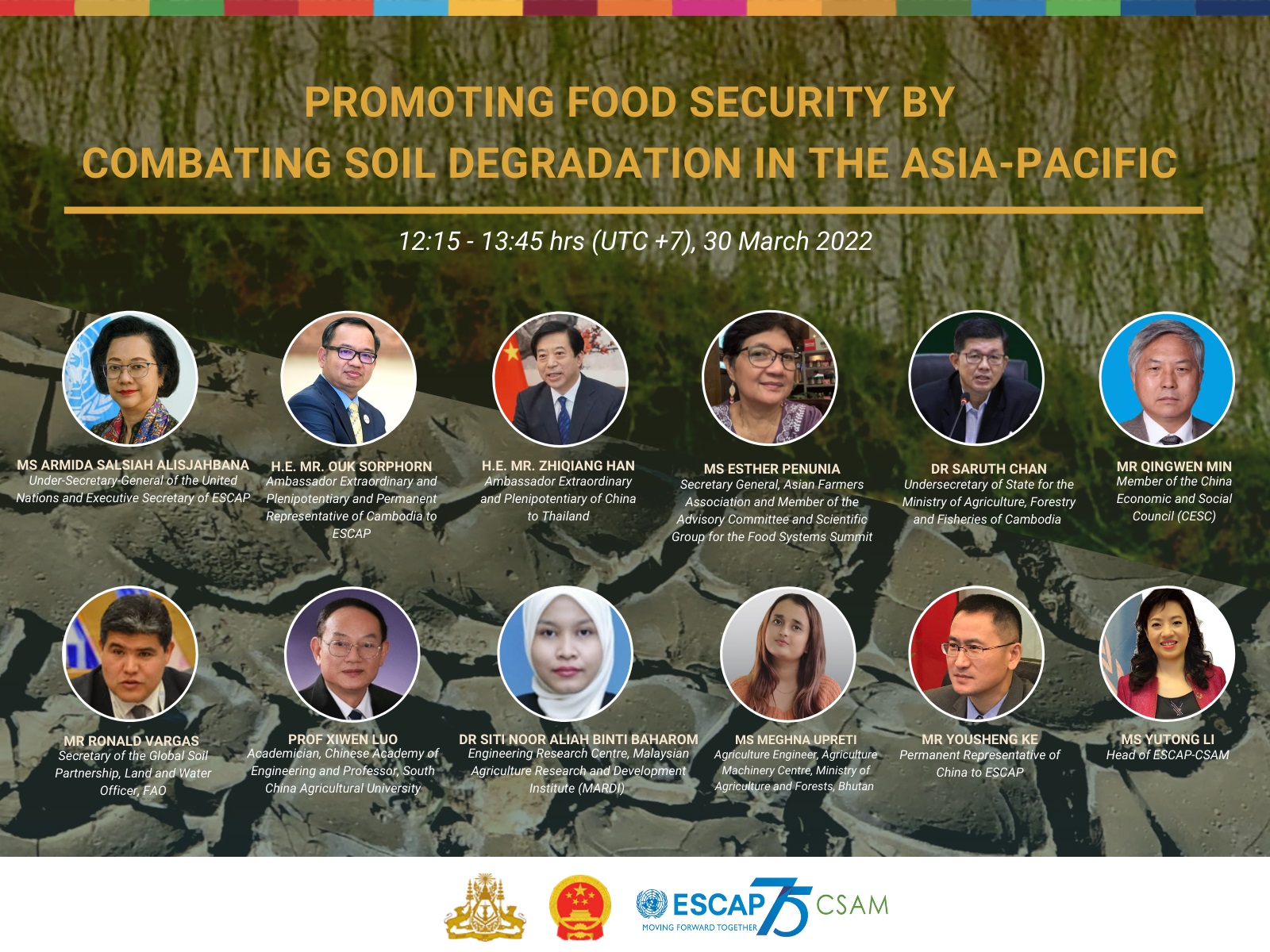CSAM facilitates discussion on Promoting Food Security by Combating Soil Degradation in the Asia-Pacific

Meeting Documents
CSAM and the Permanent Missions of Cambodia and China to ESCAP co-hosted an online event to discuss “Promoting Food Security by Combating Soil Degradation in the Asia-Pacific” alongside the 9th Asia-Pacific Forum on Sustainable Development on 30 March 2022. The event linked the preservation of soil health to food security in the context of Sustainable Development Goals 2 (Zero Hunger) and 15 (Life on Land).
The event was opened by remarks from the United Nations Under-Secretary-General and Executive Secretary of ESCAP, Ms. Armida Salsiah Alisjahbana, who underscored that although modern technologies and machinery are crucial to achieving the needed levels of food productivity, they should be sustainable by ensuring soil preservation while alleviating the farmers’ increased labor needs and reducing the application of agrochemical inputs. H.E. Dr. Ouk Sorphorn, Ambassador Extraordinary and Plenipotentiary to Thailand and Permanent Representative of Cambodia to ESCAP, highlighted that Cambodia has stepped up to establish a national mechanism in the form of a network of organizations that implement activities related to Conservation Agriculture, namely the Cambodia Conservation Agriculture and Sustainable Intensification Consortium (CASIC). H.E. Mr. Zhiqiang Han, Ambassador Extraordinary and Plenipotentiary of China to Thailand, called for deepening agricultural cooperation to reinforce biodiversity protection, promote sustainable agricultural mechanization, and strengthen soil degradation management. He also invited all parties to jointly promote sustainable agricultural development, improve food security and advance the implementation of the 2030 Agenda through China’s Global Development Initiative (GDI).
The ensuing panel discussion was moderated by the Head of CSAM, Dr Yutong Li, and presented good practices in the region and beyond, showing that sustainable soil management can benefit not only food security but also carbon sequestration and empowerment of vulnerable groups and women in the agricultural workforce. The panel included different stakeholders representatives: Ms. Esther Penunia, Secretary General of the Asian Farmers Association and Member of the Advisory Committee and Scientific Group for the Food Systems Summit; Mr. Ronald Vargas, Secretary of FAO Global Soil Partnership; Mr. Qingwen Min, Member of the China Economic and Social Council (CESC) and the Institute of Geographic Sciences and Natural Resources Research at the Chinese Academy of Sciences (CAS); Dr. Saruth Chan, Undersecretary of State for the Ministry of Agriculture, Forestry and Fisheries of Cambodia; Prof. Xiwen Luo, Academician of the Chinese Academy of Engineering and Professor at the South China Agricultural University; Dr. Siti Noor Aliah binti Baharom from the Engineering Research Centre of the Malaysian Agriculture Research and Development Institute (MARDI); and Ms. Meghna Upreti, Agriculture Engineer at the Agriculture Machinery Centre of the Ministry of Agriculture and Forests of Bhutan. Their presentations highlighted the need for a strong commitment in policy, investment, and inclusion of farmers’ voices to ensure that existing good practices are scaled up. The adoption of sustainable agricultural practices and new technologies is key to discontinue unsustainable practices which lead to land degradation, and to ultimately achieve the transformation of our food systems. The event was closed by Mr Yousheng Ke, Permanent Representative of China to ESCAP, who stressed the invitation to countries in the Asia-Pacific to commit to solidarity and cooperation for food security.
A recording of the event is available at https://youtu.be/Q8xJmtToWlA
